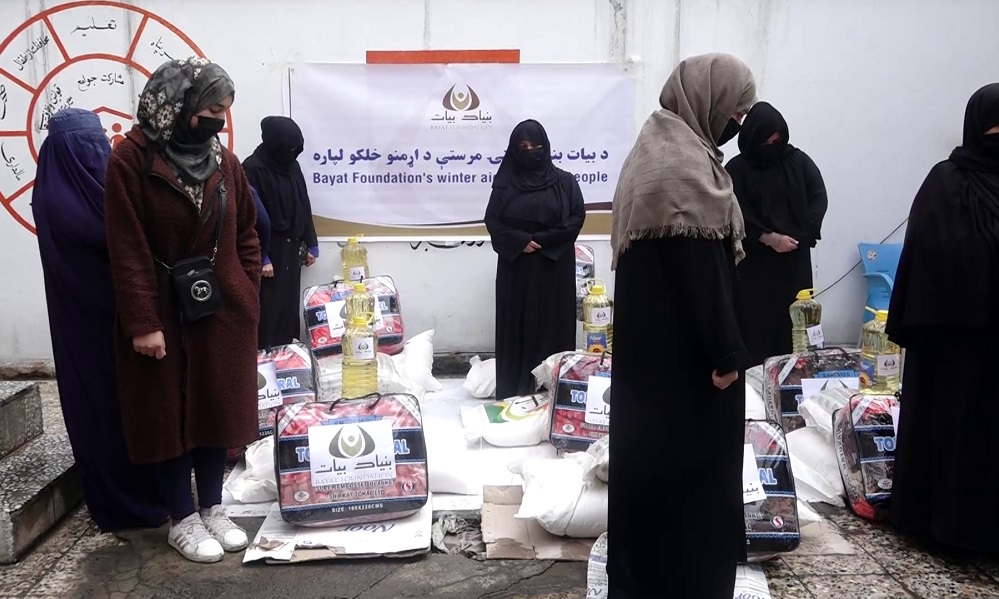Latest News
Nine in 10 Afghans are not consuming enough food: WFP

Ninety-three percent of Afghan families are not consuming sufficient food, the World Food Programme said on Friday.
WFP also said three out of four households are using extreme coping mechanisms, such as skipping meals or preferring to give food to children instead of adults.
The WFP conducted a telephone survey from June 17 to September 5, asking 1,600 random households per month about their food habits. The agency reported a “marked difference” between the period up to the August 15 and then following August 20.
“The portion of families resorting to extreme coping mechanisms, those are things like skipping meals or preferring to give food to children instead of adults or limiting portion sizes to make food last longer had almost doubled”, WFP’s deputy regional director for Asia and the Pacific, Anthea Webb said.
Afghanistan is facing economic collapse after foreign countries and institutions said they would withhold aid and monetary reserves after the Islamic Emirate of Afghanistan took control of Kabul last month.
“It’s now a race against time and the snow to deliver life-saving assistance to the Afghan people who need it most. We need to be reaching nine million people per month by November if we are to meet our planned target of 14 million by the end of the year,” Webb said, urging donors to fill the 200 million dollars’ appeal ahead of an international aid conference for Afghanistan on September 13.
Many Afghans were struggling to feed their families amid severe drought well before the Islamic Emirate took control and millions may now face starvation with the country isolated and the economy unraveling, aid agencies reported.
“People do not have access to the money they need to buy food, food prices have gone up, fuel prices have gone up. There simply is an inability for the poorest people and very soon the not so poor people to be able to buy enough food to survive”, Webb said.
Malnutrition already affects one in two children under the age of five in Afghanistan, where 14 million people or one-third of the population faces “acute food insecurity,” the WFP says.
Its latest assessment says that 15 of Afghanistan’s 34 provinces showed less food consumption in the last month, the worst-hit being Ghazni, Khost, and Paktika in the east.
Latest News
Turkish intelligence captures a Daesh member near the Durand Line

Turkish intelligence agents have captured a senior member of Daesh near the Durand Line, reportedly preventing planned suicide attacks in Turkey and other countries, according to Turkey’s state-run Anadolu Agency on Monday.
The suspect, identified as Mehmet Goren, is a Turkish citizen. He was apprehended during a covert operation and transferred to Turkey. Details on the timing of the operation or the involvement of Afghan and Pakistani authorities were not disclosed.
According to the report, Goren had risen through the ranks of Daesh and was allegedly tasked with carrying out suicide bombings in Turkey, Pakistan, Afghanistan, and Europe.
Daesh has a history of deadly attacks in Turkey, including the January 1, 2017 shooting at an Istanbul nightclub that killed 39 people.
Anadolu Agency reported that Goren’s arrest also provided intelligence on the group’s recruitment strategies and planned activities.
Latest News
Dozens of needy families in Kabul receive winter aid from Bayat Foundation

Dozens of needy families in Kabul’s fifth district have received essential winter assistance from the Bayat Foundation, as part of ongoing efforts to ease hardship during the cold season and worsening economic conditions.
According to foundation officials, the aid package includes staple food items such as flour, rice, and cooking oil, along with warm blankets to help families cope with freezing temperatures. Haji Mohammad Ismail, Deputy Head of Bayat Foundation, said the distribution began in Kabul and will soon be expanded to other provinces.
“Our assistance includes flour, rice, cooking oil, and blankets,” Ismail said. “Today, we started distributing these items in Kabul’s fifth district, and God willing, the aid will reach other provinces in the near future.”
Afghanistan continues to face widespread poverty, unemployment, and food insecurity, with many families struggling to meet basic needs, particularly during winter when access to work and heating becomes more difficult.Humanitarian organizations and charitable foundations have stepped up relief efforts to support those most affected.
Beneficiaries welcomed the assistance, describing it as a lifeline. “May God bless you for helping the poor. We had nothing and no work,” said one recipient. Another added, “Thank you for your help. Our flour was almost finished.”
Bayat Foundation officials stressed that winter aid distributions will continue in Kabul and other provinces in the coming days, as part of their broader commitment to supporting needy families across the country.
Latest News
Nearly seven million Afghan refugees return home since Islamic Emirate’s takeover

Since the Islamic Emirate came to power, approximately 6.8 million Afghans have returned home, either voluntarily or forcibly, from neighboring countries and other nations, according to the Minister of Refugees and Repatriation.
Mawlawi Abdul Kabir, speaking at a meeting on finalizing a draft plan for a permanent migration solution in Afghanistan, added that 1.3 million Afghans have been internally displaced due to natural disasters during the same period.
With winter approaching, widespread poverty and severe cold are threatening thousands of lives. Meanwhile, the forced expulsion of Afghan migrants from neighboring countries, particularly Iran and Pakistan, continues.
The Islamic Emirate has repeatedly urged neighboring states to allow migrants to return voluntarily. According to UNHCR, over two million Afghans have returned from Iran and Pakistan since the start of 2025.
-

 Latest News2 days ago
Latest News2 days agoAfghanistan signs 30-year deal for marble mining in Daikundi
-

 Latest News4 days ago
Latest News4 days agoAfghan border forces prevent illegal entry of hundreds into Iran
-

 Latest News3 days ago
Latest News3 days agoPakistan summons Afghan diplomat over deadly attack in North Waziristan
-

 Latest News3 days ago
Latest News3 days agoAfghan health minister calls for medical cooperation between Kabul and New Delhi
-

 Latest News4 days ago
Latest News4 days agoJapan allocates nearly $20 million in humanitarian aid for Afghanistan
-

 Latest News3 days ago
Latest News3 days agoKarzai urges reopening of girls’ schools and universities for Afghanistan’s bright future
-

 Business5 days ago
Business5 days agoAfghanistan-Kazakhstan banking ties discussed in Kabul meeting
-

 Latest News2 days ago
Latest News2 days agoBush Institute criticizes Trump administration’s Afghan immigration freeze
























